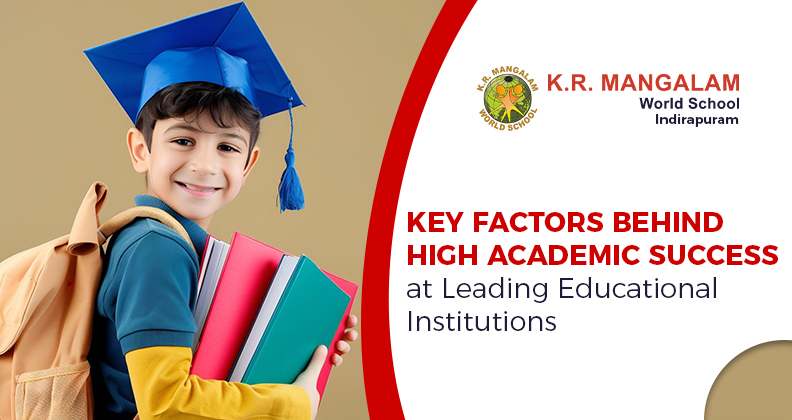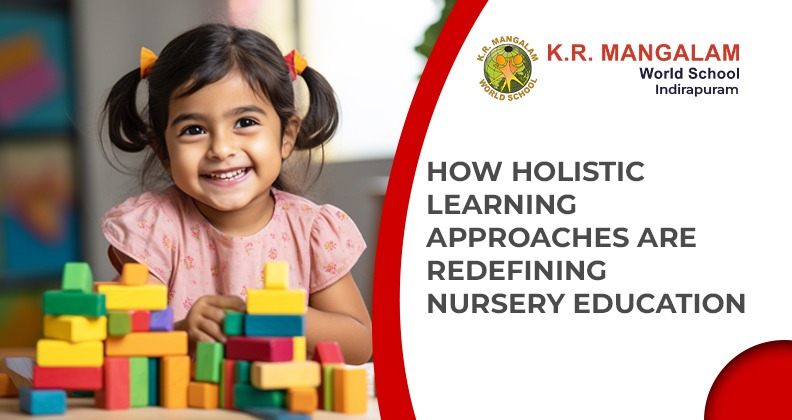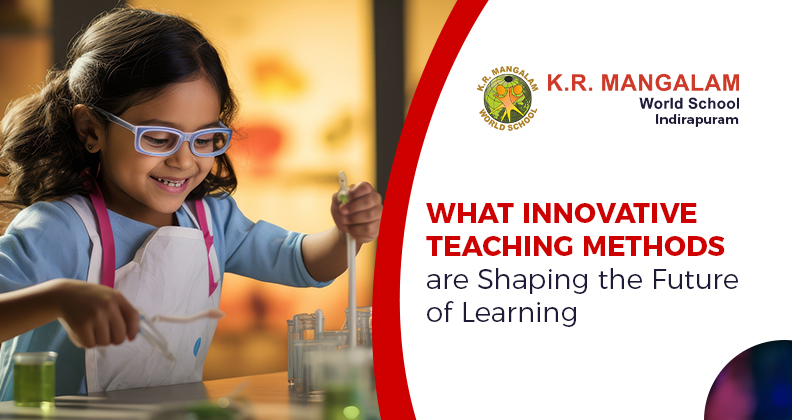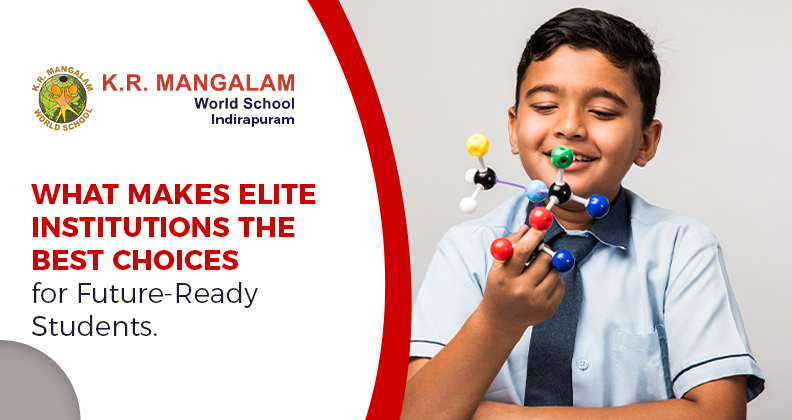Introduction:
Achieving academic success is not just about excelling in exams and tests but about creating a robust foundation for lifelong learning. At K.R. Mangalam world School, Indirapuram, the Top Schools in Vaishali Ghazibad where these leading educational institutions are known for fostering high academic achievement, there are several key factors that contribute to this success. From a strong curriculum and experienced educators to modern teaching methodologies and a supportive environment, these institutions set the stage for students to achieve their fullest potential. In this article, we explore the key factors that contribute to academic excellence in top-rated schools, providing a blueprint for institutions aiming to help students reach the peak of their academic journeys.
About Us:
The academic success of K.R. Mangalam World School, Indirapuram, is driven by a holistic approach to education. We combine rigorous academic programs with practical experiences and co-curricular activities that ensure well-rounded student development. Our highly qualified faculty members employ modern teaching methodologies that encourage active participation and deep learning, while our state-of-the-art infrastructure supports diverse learning needs. Additionally, our commitment to fostering a growth mindset and encouraging curiosity helps students excel academically and beyond. With strong academic support systems, mentorship, and global learning opportunities, our students consistently achieve high academic success and are well-prepared for the future.
1. A Rigorous and Well-Structured Curriculum
One of the primary drivers of academic success is a well-structured curriculum that is both rigorous and balanced. Leading educational institutions design their curricula to ensure that students gain in-depth knowledge in core subjects while also being exposed to a broad range of disciplines. This approach allows students to build a strong academic foundation while nurturing their interests in various areas such as arts, sports, and humanities.
The curriculum should align with both national and international standards, ensuring students are well-prepared for higher education and the global workforce. A rigorous curriculum challenges students to push their intellectual boundaries and think critically, developing essential skills such as problem-solving, analysis, and independent thinking. At the same time, the curriculum is designed to be flexible, allowing for personalized learning and catering to the diverse learning styles of students.
Moreover, academic success is also facilitated by a curriculum that incorporates emerging trends in education, such as technology, sustainability, and global issues. This helps students not only understand core subjects but also adapt to the ever-changing demands of the modern world.
2. Experienced and Dedicated Faculty
The quality of teachers plays a pivotal role in determining the academic success of students. Leading institutions invest in hiring highly qualified, experienced, and dedicated educators who are experts in their respective fields. These educators not only have deep knowledge of the subjects they teach but also a passion for fostering a positive learning environment.
Experienced teachers are skilled at identifying the strengths and weaknesses of their students, allowing them to tailor their teaching strategies accordingly. By offering personalized attention and guidance, they help students overcome academic challenges and develop a deep understanding of the subject matter. Moreover, dedicated teachers inspire a love for learning, motivating students to strive for excellence both inside and outside the classroom.
In addition to subject expertise, educators in top institutions are often trained in modern teaching methodologies that enhance student engagement and facilitate active learning. This allows them to create interactive lessons that cater to different learning styles and ensure that students remain engaged and motivated throughout their academic journey.
3. Focus on Critical Thinking and Problem-Solving Skills
Academic success is not just about memorizing information; it’s about developing the skills necessary to apply that knowledge in real-world situations. Leading institutions emphasize the development of critical thinking and problem-solving skills, which are essential for success in both academics and life.
In these institutions, students are encouraged to ask questions, challenge assumptions, and explore various perspectives. This approach fosters independent thinking and helps students become active learners who are capable of analyzing problems, proposing solutions, and evaluating outcomes. These skills are crucial in an era where innovation and adaptability are key to success in the workplace.
Teachers in these institutions use innovative teaching methods such as case studies, debates, discussions, and problem-based learning to help students develop these skills. By engaging with real-life problems and collaborating with their peers, students learn to think critically, make informed decisions, and solve complex issues.
4. Advanced Technology Integration
In today’s digital age, technology plays a significant role in shaping academic success. Leading educational institutions understand the importance of integrating technology into the learning process. From interactive whiteboards and digital textbooks to online learning platforms and virtual classrooms, technology enhances the learning experience by making it more engaging, accessible, and efficient.
Technology enables personalized learning, allowing students to progress at their own pace and access resources that cater to their individual learning needs. For example, adaptive learning tools can provide real-time feedback and adjust the difficulty level based on each student’s performance, helping them to stay on track and master concepts before moving on to more advanced topics.
Moreover, technology equips students with the digital literacy skills they will need to succeed in the future. By incorporating technology into the curriculum, top schools ensure that their students are prepared for a world where digital tools and platforms are integral to almost every industry.
5. Student-Centered Approach to Learning
Academic success is often driven by a student-centered approach to learning, which places the student at the heart of the educational experience. In top-rated institutions, the focus is not just on teaching but on creating an environment where students are actively involved in their learning journey.
A student-centered approach encourages students to take ownership of their education. They are given the autonomy to choose topics that interest them, pursue independent research, and engage in collaborative projects. This fosters a sense of responsibility and empowers students to take charge of their own academic success.
Additionally, student-centered institutions prioritize individual learning styles, recognizing that every student learns differently. Whether through visual aids, hands-on activities, or verbal discussions, teachers use a variety of methods to engage students and ensure they fully understand the material.
6. Regular Assessments and Feedback
Regular assessments and timely feedback are crucial in helping students understand their academic progress and areas for improvement. Leading educational institutions implement a range of assessment methods, including formative assessments, quizzes, assignments, projects, and summative exams, to monitor student performance throughout the year.
These assessments provide valuable insights into student learning and help teachers identify areas where students may be struggling. By offering constructive feedback, teachers can guide students toward improving their understanding and skills. This feedback loop is essential for academic success, as it allows students to track their progress, set goals, and take corrective action when needed.
Moreover, regular assessments help in identifying high achievers and providing them with opportunities for advanced learning, such as enrichment programs or special projects. This ensures that all students, regardless of their academic standing, are supported in their educational journey.
7. Encouragement of Extracurricular Activities
While academics are a major focus in leading institutions, extracurricular activities also play a crucial role in fostering overall academic success. These activities help students develop skills such as leadership, teamwork, communication, and time management, all of which contribute to their success both in school and beyond.
Schools that prioritize extracurriculars offer a variety of options, including sports, arts, music, drama, debate, and community service. These activities provide students with opportunities to explore their passions, develop new talents, and create a balanced life that promotes well-being.
Extracurricular activities also help students build resilience and confidence, as they learn to navigate challenges and setbacks. This, in turn, positively impacts their academic performance, as students are better able to manage stress and maintain a healthy work-life balance.
8. A Positive and Supportive School Culture
A positive and supportive school culture is fundamental to academic success. Leading educational institutions create an environment where students feel safe, respected, and valued. This culture of inclusivity, respect, and collaboration encourages students to perform at their best, both academically and socially.
In such environments, students are encouraged to be themselves and express their ideas freely. A supportive school culture fosters strong relationships between students, teachers, and parents, creating a community that works together to support each student’s success.
Additionally, a positive school culture promotes emotional well-being, which is crucial for academic success. When students feel mentally and emotionally supported, they are more likely to perform well in their studies and be motivated to achieve their goals.
9. Parent and Community Involvement
Successful schools recognize that education is a collaborative effort that involves not just the teachers and students but also the parents and the wider community. Leading educational institutions foster strong relationships with parents, encouraging them to be actively involved in their child’s education.
By maintaining open lines of communication with parents, schools ensure that they are aware of their child’s academic progress, challenges, and achievements. Parent-teacher meetings, school events, and community outreach programs provide opportunities for parents to engage with the school and support their child’s educational journey.
Moreover, community involvement helps create a strong support network for students, providing them with additional resources, mentorship, and opportunities to engage in real-world learning experiences.
10. Commitment to Continuous Improvement
Top educational institutions understand that success is not static but a continuous process of growth and improvement. These institutions are committed to evaluating and enhancing their teaching methods, curricula, and facilities to ensure that they stay at the forefront of educational excellence.
By embracing a culture of continuous improvement, schools are able to adapt to the changing needs of students, society, and the global workforce. This commitment to excellence ensures that students are always receiving the best education possible, and it helps maintain the institution’s reputation as a leader in academic success.
Conclusion:
The key factors behind high academic success at leading educational institutions are not just about excellent teachers or a strong curriculum—they are about creating a supportive, engaging, and innovative learning environment that fosters the overall development of students. At K.R. Mangalam world School, Indirapuram, the Best Schools in Vaishali Ghaziabad where from personalized learning and critical thinking to the integration of technology and extracurricular activities, these institutions are shaping the leaders, thinkers, and innovators of tomorrow.
By combining a rigorous academic approach with a focus on holistic development, leading institutions provide students with the tools they need to succeed in both their academic pursuits and their future careers. Whether it’s through strong leadership, a positive school culture, or active parent involvement, these factors work together to ensure that students not only achieve academic excellence but also become well-rounded individuals prepared to navigate the challenges of the future.
FAQs:
- What factors contribute to academic success at leading schools?
Academic success at top institutions is driven by quality teachers, a strong curriculum, a supportive environment, and a focus on developing critical thinking, problem-solving, and time management skills. - How does K.R. Mangalam ensure academic excellence?
We provide a comprehensive curriculum, utilize modern teaching methods, and offer academic support, ensuring that every student has the tools and resources they need to succeed. - Why is a strong support system important for academic success?
A strong support system helps students overcome challenges, stay motivated, and improve their academic performance. It includes mentoring, counseling, and regular assessments to track progress. - How does K.R. Mangalam track and measure academic progress?
We use regular assessments, feedback sessions, and individualized learning plans to track progress, ensuring that students receive the attention they need to reach their academic goals. - How do extracurricular activities contribute to academic success?
Extracurricular activities develop leadership, teamwork, and time management skills, all of which contribute to academic success by providing a balanced and enriching experience for students.












